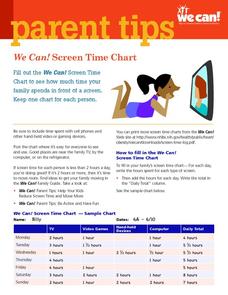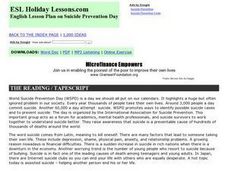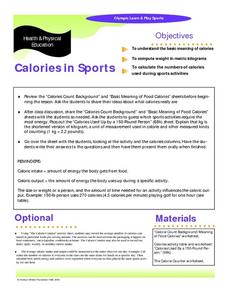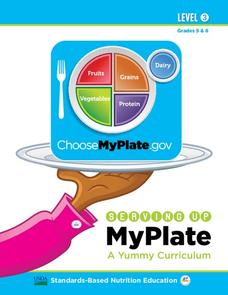Laguna Middle School
Personal Physical Fitness Plan
Sticking to a physical fitness plan can be tricky. Support young athletes' personal fitness goals with a helpful and strategie lesson plan. They reflect on their daily habits through a pre-assessment and questionnaire, create short and...
We Can!
We Can! Screen Time Chart
Screens are everywhere these days, from televisions and video games to cell phones and computers. Raise awareness of excessive screen time by helping your learners track how much time they each accumulate on a daily basis looking at...
Choose My Plate
My Daily Food Plan (18+ years old)
Manage your calorie intake with a daily food plan journal. After reviewing a reference sheet with suggested amounts of each food group based on a total calorie pattern, learners can jot down what foods they have eaten during the day as...
American Physiological Society
It’s the Heart of the Matter
Get the class jumping for joy with a fascinating look at matters of the heart. Learners perform physical tasks, collect and analyze heart rate data, and study conditions that affect heart health. Use the action-packed lesson plan to...
Curated OER
ESL: World Suicide Prevention Day
Help to educate your ESL students about World Suicide Prevention Day with this series of activities. Matching key phrases, completing CLOZE paragraphs, and choosing appropriate words based on context clues are just a few of the many ways...
Curated OER
Calories in Sports
This 4-page worksheet includes information on caloric intake and output, an activity/calorie chart, and a form for calculating the amount of calories in various foods. A good introduction to calories.
US Department of Agriculture
Serving Up My Plate
Within three nutrition-themed, inquiry-based learning opportunities, pupils take notice of their eating habits; delve deep into the five food groups, gain experience in planning meals, participate in a taste test, and explore ads from...
American Physiological Society
Drug the Water Flea
This is a flea. This is a flea on drugs. Any questions? Your class will have questions aplenty during an impactful experiment. Lab groups get to know Daphnia magna, the humble water flea, and study the effects of stimulants and...
Curated OER
Food Categories
In this recognizing the food groups worksheet, students read a breakfast and lunch menu for astronauts and complete a food chart by writing the bold lettered foods in the correct categories. Students write 17 answers.
Curated OER
The Five Food Groups
In this food groups worksheet, students use the colorful 7 day diary to color a star for each food group eaten each day. Students do not record how many servings from each group, just that they have eaten a food from it.
Curated OER
Track Your Food Today
In this food log worksheet, students analyze what they eat in a single day. Students fill in the chart for the food groups and the different meals and snacks consumed throughout the day.
Curated OER
A Healthy Lunch Gives Me Energy
In this food log worksheet, students analyze what they eat in a single week. Students fill in the chart for the foods consumed for lunch each day.
Curated OER
Oral Care Calendar
In this dental care calendar worksheet, students put a happy face in the box for each day on the calendar that they brush their teeth twice.
Curated OER
My Pyramid
In this food pyramid worksheet, students fill in the 5 boxes at the bottom of the food pyramid and draw or color foods within the 5 food pyramid areas.
Curated OER
Wash Your Hands Charts
In this hand washing chart worksheet, students put a check mark in the squares under the days of the week each time they wash their hands. They place the marks under the icon of the sun or the moon to indicate if they washed their hands...
Curated OER
Testing for Life’s Molecules
Want to hear a joke about sodium? Na. Young scientists test various materials to identify if they include protein, starch, and glucose by using the Biuret test, iodine starch test, and Benedict's test respectively. After practicing with...
Curated OER
Brush Your Teeth - Recording Sheet
In this teeth brushing chart worksheet, students put a check mark in the squares under the days of the week each time they brush their teeth. They place the marks under the icon of the sun or the moon to indicate if they brushed their...
American Physiological Society
Sticky Adaptations A Lesson on Natural Selection
Now you see it, now you don't! The stick bug exhibits the ability to disappear into a wooded environment. Why does this adaptation manifest in some species, but not in others? Life science students explore animal adaptations in nature...
American Physiological Society
Effects of Environment on Enzymes
Much like the tale of Humpty Dumpty, proteins, once altered, will never be the same again. Honors and pre-AP biology classes explore the delicate world of enzymes via a Webquest and lab experiment. The teacher's guide contains all...
PBS
Technology: Conveniences and Consequences
It's a delicate balance—using technology to improve our lives while still protecting the environment, and ourselves, from the hazards of technology use. Class members examine statistics about the increase in media use, complete a survey...
American Physiological Society
Did I Observe it or Infer it?
Take the mystery out of inquiry! When young scientists learn to use their keen powers of observation to make smart inferences about a situation, they are well on their way to understanding what the scientific method is all about. Using...
American Physiological Society
What Environmental Conditions Lead to the Hatching of Brine Shrimp?
Will changing the environment in which brine shrimp live impact their reproductive success? Young scientists get hands-on experience studying the habitat of brine shrimp in a two-week immersion lesson. The teacher's guide provides all of...
American Physiological Society
How Does the Density of a Liquid Affect the Buoyancy of an Object?
Here's a lesson plan that will really float your boat! Introduce physical science scholars to the relationship between buoyancy and density through an assortment of individual and collaborative exercises. Lab groups work together to...
American Physiological Society
Why is Kettle Corn Cooked in Copper Pots?
The kitchen — it's not just for eating anymore! Specific heat is often a difficult concept to grasp, so give it context by relating it to cooking. Learners gain experience in the principles of thermal energy transfer by designing an...
Other popular searches
- Physical Education & Health
- Health Education Objectives
- Heart Health Education
- Career and Health Education
- Social Health Education
- Consumer Health Education
- Health Education Mystery
- Health Education Chemistry
- Health Education Nutrition
- Disease Health Education
- Physical Education and Health
- Physical Education Health

























